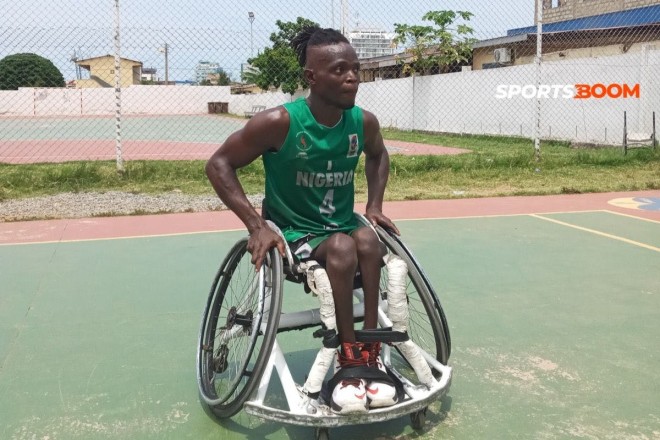Admin I Friday, March 01, 2024
LAGOS – Nigerian wheelchair basketball star Segun Bailey recently sat down for an interview with Wade McElwain from SportsBoom.com, detailing his inspiring journey in the sport.
The 30-year-old Bailey has overcome immense challenges to pursue his professional basketball dreams, and is hoping to accelerate not only his career, but the potential for African wheelchair athletes as well.
From Tennis to Basketball
Bailey first found success as a wheelchair tennis player in his home country of Nigeria. However, after watching a wheelchair basketball game for the first time, Bailey was drawn to the fast pace and constant motion of the sport.
Bailey speaks:
“In basketball, you’re always moving…you’re always running around on the court…watching your back… pressing your opponent and blocking them all the time.”
Though initially exhausted after his first intense practice session outdoors on a hot day, Bailey was hooked on wheelchair basketball from that point forward, and never returned to wheelchair tennis.
Bailey’s transition to basketball has also meant spending more time in the gym developing his strength and conditioning. “ Lemme tell you personally, I, I love to gym. I love to gym. I, I have more confidence going to the gym…and then to get, to gain more strength and to gain more power.”
Skill Classification in Wheelchair Basketball
In wheelchair basketball, players are assigned a point value from 0.5 to 4.5 based on their functional abilities. Lower point values are given to players with more significant impairments. As a polio survivor, Bailey is classified as a 2.5 point player.
According to Bailey, “You are classified based on your torso and how your torso can move, how you can react to the ball. So mostly that is where we’re classified.”
Bailey primarily plays the shooting guard position for his club team, Lagos Wheelchair Basketball, though he can shoot effectively with both hands.
Rapid Growth and New Opportunities
Wheelchair basketball has seen rapid growth in popularity and participation in Nigeria in recent years. This April, Nigeria will hold its first ever wheelchair basketball league with multiple club teams competing in a riveting season for athletes across the country.
Bailey is extremely excited about the potential opportunities the new league could provide, saying “I think a lot of sponsors will come in, because wheelchair basketball is actually a fun game, it’s entertaining.”
He hopes the increased exposure will provide inspiration for young Nigerians with disabilities who want to get involved in sports.
Beyond growing the sport domestically, Bailey aspires to achieve his dream of playing professional wheelchair basketball overseas. As he continues to improve his game through rigorous training, he is determined to join a top European league in Germany in the near future.
“I’m looking forward to play in the league in Germany it’s very strong. And I want to play pro, you know, I think I’m good enough to play in that league.”
With the Paralympic Games coming to Los Angeles in 2028, the Nigerian national wheelchair basketball team also has a goal of qualifying to compete on the world’s biggest stage. Though Nigeria has come up short in prior Paralympic qualifying tournaments, Bailey is optimistic the program can develop into a global force over the next four years.
Segun Bailey’s passion for growing wheelchair basketball shines through in every word he speaks. Though Nigeria currently faces many infrastructural and organisational challenges in adaptive sports, driven advocates like Bailey are working tirelessly to bring the exhilarating game of wheelchair basketball into the spotlight
